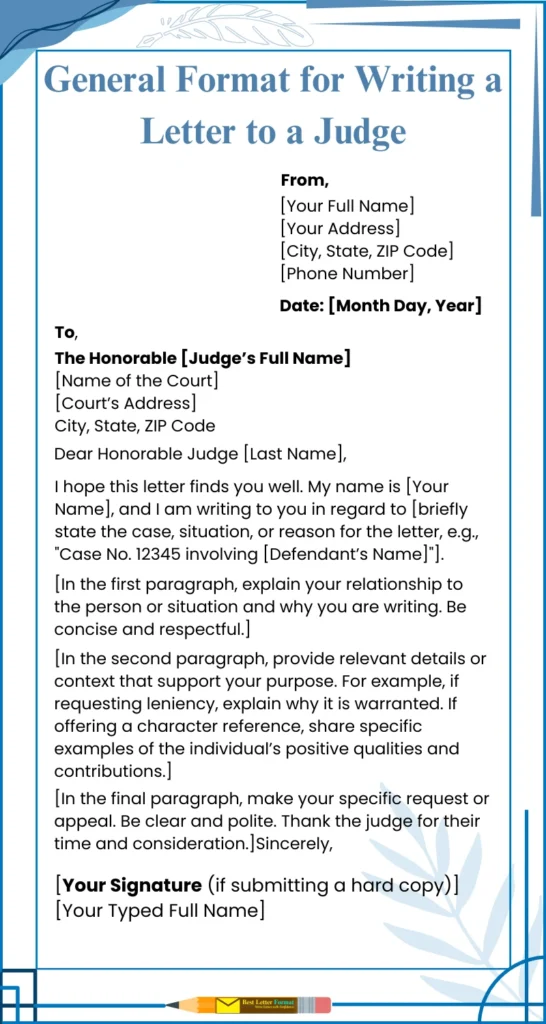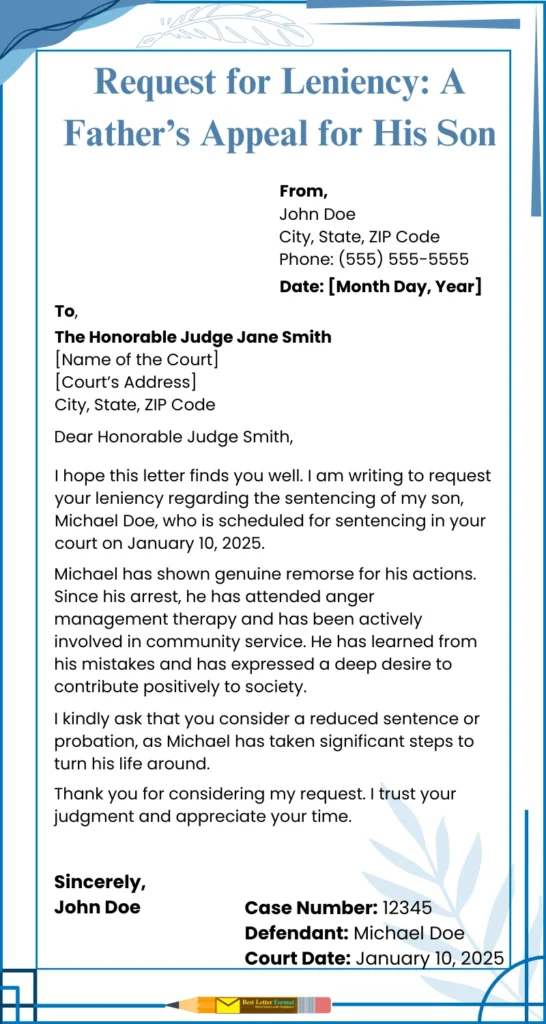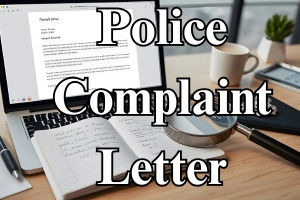How to Write a Letter to a Judge: Step-by-Step Guide with Examples and Tips
Published: 28 Dec 2024

Writing a letter to a judge can seem tough, especially when it’s about a legal matter. But with the right approach, it’s a chance to respectfully share your thoughts and ask for fairness, understanding, or a little leniency.
In this guide, I’ll show you how to write a letter to a judge, with easy-to-follow tips and real-life examples. Whether you need to write a character reference, ask for a lighter sentence, or explain something important, this guide will help you put your letter together in a clear, professional way while still making it personal.
1. Understand the Purpose of the Letter
Before diving into the letter, it’s important to understand why you’re writing it. Are you asking for leniency in a case, giving a character reference, or explaining something related to a court hearing?
Common Purposes of Writing a Letter to a Judge:
- Requesting leniency for someone facing sentencing.
- Providing a character reference for a defendant.
- Explaining mitigating circumstances or important context that the court may not be aware of.
2. Structure Your Letter Properly
A well-structured letter is both professional and easy to follow. Below is a simple format that ensures clarity and respect:
Step 1: Begin with Your Contact Information
Start with your name, address, phone number, and email at the top. This is your personal information that the judge can use to contact you.
Example: John Doe
123 Main Street
City, State, ZIP Code
Phone: (555) 555-5555
Email: johndoe@email.com
Date: December 28, 2024
Step 2: Add the Judge’s Information
Next, include the judge’s name and the court’s address.
Example: The Honorable Judge Jane Smith
[Name of the Court]
[Court’s Address]
City, State, ZIP Code
Step 3: Salutation
The greeting should be respectful. Always address the judge as Honorable Judge followed by their last name. For example:
- Dear Honorable Judge Smith,
- Dear Judge Doe,
If you’re not sure about the judge’s name, simply write “Dear Honorable Judge”.
Step 4. State the Purpose Clearly
Start by clearly explaining why you’re writing. Be honest but respectful. A direct and clear opening sets the tone of your letter.
Example: “I am writing to request your leniency regarding the sentencing of my son, Michael Doe, who is scheduled for sentencing in your court.”
Step 5. Provide Supporting Details
Now, elaborate on why you’re writing. Share relevant information that will help the judge make an informed decision. If you’re providing a character reference, highlight the person’s positive qualities, efforts to improve, and any remorse they’ve shown.
Example: “Michael has shown genuine remorse for his actions. Since his arrest, he has attended anger management therapy and has been actively involved in community service. He has learned from his mistakes and has expressed a deep desire to contribute positively to society.”
Step 6. Make Your Request
Be clear about what you’re asking for. Do you want a reduced sentence, probation, or some other consideration? State this request politely but directly.
Example: “I kindly request that you consider a reduced sentence or probation, as Michael has taken significant steps to turn his life around.”
Step 7. Conclusion and Signature
Finish your letter with a respectful closing such as “Sincerely” or “Respectfully.” Leave space for your signature and type your full name below it.
Example: “Sincerely,
John Doe”
Step 8. Proofread and Check for Accuracy
Before sending your letter, make sure there are no errors. A well-written, error-free letter demonstrates respect and professionalism.
3. General Format for Writing a Letter to a Judge
Below is a versatile format that can be used for writing letters to a judge, regardless of the purpose (leniency, character reference, explanation, etc.).
[Your Full Name]
[Your Address]
[City, State, ZIP Code]
[Phone Number]
[Email Address] (optional)
[Date]
The Honorable [Judge’s Full Name]
[Name of the Court]
[Court Address]
[City, State, ZIP Code]
Dear Honorable Judge [Last Name],
Subject: [State the Purpose of the Letter Clearly]
I hope this letter finds you well. My name is [Your Name], and I am writing to you in regard to [briefly state the case, situation, or reason for the letter, e.g., “Case No. 12345 involving [Defendant’s Name]”].
[In the first paragraph, explain your relationship to the person or situation and why you are writing. Be concise and respectful.]
[In the second paragraph, provide relevant details or context that support your purpose. For example, if requesting leniency, explain why it is warranted. If offering a character reference, share specific examples of the individual’s positive qualities and contributions.]
[In the final paragraph, make your specific request or appeal. Be clear and polite. Thank the judge for their time and consideration.]Sincerely,
[Your Signature (if submitting a hard copy)]
[Your Typed Full Name]

4. Request for Leniency: A Father’s Appeal for His Son
Writing a letter to a judge can be a daunting task, but when done sincerely, it can shed light on a person’s efforts to reform and the support they have from loved ones. Below is an example of a heartfelt request from a father, appealing for leniency in his son’s sentencing. It reflects respect, clarity, and an understanding of the legal process.
John Doe
123 Main Street
City, State, ZIP Code
Phone: (555) 555-5555
Email: johndoe@email.com
Date: December 28, 2024
The Honorable Judge Jane Smith
[Name of the Court]
[Court’s Address]
City, State, ZIP Code
Dear Honorable Judge Smith,
I hope this letter finds you well. I am writing to request your leniency regarding the sentencing of my son, Michael Doe, who is scheduled for sentencing in your court on January 10, 2025.
Michael has shown genuine remorse for his actions. Since his arrest, he has attended anger management therapy and has been actively involved in community service. He has learned from his mistakes and has expressed a deep desire to contribute positively to society.
I kindly ask that you consider a reduced sentence or probation, as Michael has taken significant steps to turn his life around.
Thank you for considering my request. I trust your judgment and appreciate your time.
Sincerely,
John Doe
Case Number: 12345
Defendant: Michael Doe
Court Date: January 10, 2025

5. Tips for Writing a Letter to a Judge
Here are some practical tips that will help you write a strong and respectful letter to a judge:
- Be Direct: Start with a clear explanation of why you’re writing and what you’re asking for.
- Keep It Concise: The judge is busy and will appreciate a brief but thoughtful letter.
- Be Honest: Always be truthful and avoid exaggerating facts.
- Maintain a Professional Tone: Even if you have a personal relationship with the person involved, the letter should be formal.
- Use Clear Language: Avoid using complex legal terms or jargon. Keep the language simple and understandable.
- Proofread: Check your letter for any mistakes, as they can undermine the professionalism of your request.
- Follow the Rules: If there are specific guidelines or deadlines for submitting letters, be sure to follow them carefully.
6. Different Types of Judges’ Letters
Not all letters to judges are the same, and the type of letter you’re writing depends on the specific situation or request. Here are 10 common types of letters to judges, each serving a unique purpose.
- Character Reference Letter
This type of letter is written to vouch for someone’s character, highlighting their good behavior, integrity, and contributions to the community. It’s often used during sentencing to show the positive side of a defendant. - Request for Leniency
A letter requesting leniency asks the judge to consider reducing a sentence or opting for alternatives like probation, based on the defendant’s remorse, rehabilitation efforts, or extenuating circumstances. - Request for Postponement
If someone is unable to attend a scheduled court hearing due to valid reasons like illness, personal emergencies, or unavoidable work conflicts, they can write a letter to the judge requesting a postponement. - Apology Letter to the Court
This letter allows a defendant to express genuine regret for their actions. It is written to show the judge that they are taking accountability and are committed to making amends. - Request for Bail Reduction
When bail is set too high for the defendant to afford, a letter to the judge can request a reduction. This type of letter explains the financial hardship and provides reasons for the request. - Request for Expungement
This letter is written to request that the court seal or remove a criminal record. It usually highlights the petitioner’s positive changes and the reasons why expungement is necessary for a fresh start. - Request for Child Custody Modification
Parents or guardians may write a letter to the judge to request changes to an existing child custody arrangement, providing reasons that demonstrate the best interests of the child. - Victim Impact Statement
In some cases, victims of a crime write to the judge to share how the crime has affected them emotionally, physically, or financially. This letter helps the judge understand the impact of the defendant’s actions. - Support Letter for Sentencing
This type of letter is written by family members or friends of the defendant to support them during sentencing. It highlights the defendant’s positive traits and efforts to reform. - Request for Probation Instead of Jail Time
A letter requesting probation seeks an alternative to incarceration, often emphasizing the defendant’s potential for rehabilitation and their willingness to comply with probation terms.
Each of these letters requires careful consideration of tone, structure, and purpose. Writing a respectful, clear, and well-organized letter ensures that your message is received effectively. If you’re interested in learning more about how to write letters like these, stay tuned for dedicated guides on each type!
7. What Happens After You Submit Your Letter to the Judge?
Once you submit your letter, the judge will consider it along with all other case details. However, letters are just one part of the decision-making process. The judge will:
- Review the Content: The judge will read your letter and evaluate the reasons or requests you’re making. They may take the letter into account when making decisions like sentencing or bail.
- Consider Other Information: The judge will also rely on evidence presented in the case, statements from the prosecutor and defense, and other documents. A letter may not drastically change the outcome, but it can influence the judge’s perception of the person involved.
- Decision: Depending on the case and the request, the judge may grant the request (such as reducing a sentence or granting bail), or they may deny it, especially if they feel the letter doesn’t provide enough supporting details.
Remember, judges have a lot of cases to review and letters are just one small part of their decision-making.
8. Common Mistakes to Avoid When Writing a Letter to a Judge
When writing to a judge, it’s important to avoid common mistakes that can make your letter less effective or even inappropriate. Here are some things to keep in mind:
- Being too emotional: While it’s okay to express feelings, avoid sounding desperate or overly emotional. Focus on facts and remain respectful.
- Using inappropriate language: Never use casual, disrespectful, or slang language. A formal tone is essential.
- Lack of clarity: Ensure your purpose and request are clear. Avoid rambling or providing irrelevant details.
- Over-explaining: Stick to the point and keep the letter concise. Judges are busy and may not have time to read lengthy documents.
- Not proofreading: Always check your letter for errors in spelling, grammar, and punctuation. An error-free letter shows respect.
9. How to Handle Emotional Content in a Letter to a Judge
Writing a letter to a judge can be emotional, especially if you’re writing on behalf of someone close to you. It’s important to strike the right balance between expressing your feelings and maintaining respect for the judge’s role. Here’s how to handle emotional content:
- Stay Respectful: Express your emotions in a respectful and controlled way. Avoid sounding overly emotional or pleading.
- Focus on the Facts: Share what has been done to improve the situation, like therapy or community service. This shows that actions, not just feelings, are making a difference.
- Be Honest: If you’re feeling emotional because of the circumstances, it’s okay to show some empathy, but always focus on the positive changes made and how the individual is working to improve.
10. FAQs about Writing a Letter to a Judge
Have questions about writing a letter to a judge? Below are answers to common queries to help you create a respectful and effective letter.
In a letter to a judge, include your contact information, the judge’s name, the case details, and a clear explanation of why you are writing. Keep your letter respectful, concise, and honest.
Yes, a well-written letter can provide valuable context or highlight important details that may influence the judge’s perspective, though it’s only one factor in their decision-making process.
Always address a judge as “The Honorable [Judge’s Last Name]” or “Dear Honorable Judge [Last Name].” This shows respect and professionalism.
Yes, you can write a letter on someone’s behalf. Include your relationship to the person, their positive qualities, and the reasons for your request, while remaining truthful.
Your tone should be formal, respectful, and sincere. Avoid emotional or confrontational language, and focus on facts and solutions.
Yes, start with your contact information, followed by the judge’s name and court address. Use a formal salutation, state the purpose of the letter clearly, and end with a respectful closing.
It’s okay to include emotions if they are relevant, but keep them balanced with facts. Judges respond more to sincerity and positive actions than overly emotional appeals.
Avoid being too informal, rambling, or using disrespectful language. Never exaggerate or lie, and always proofread your letter for errors.
A letter to a judge should be concise, ideally one to two pages, and should focus only on relevant details and requests.
In most cases, formal letters to judges should be mailed or submitted through the court. Check the court’s specific rules before sending your letter.
Conclusion
Writing a letter to a judge may feel overwhelming at first, but with the right approach, it can become a meaningful way to express your thoughts respectfully. Remember, your letter is a chance to provide important context, request fairness, or show support for someone. To recap:
- Keep it formal: Use a respectful tone and proper structure.
- Be concise: Stick to the facts and avoid unnecessary details.
- Focus on clarity: Clearly state your purpose and make your request.
- Avoid mistakes: Proofread your letter to ensure it is error-free.
- Follow guidelines: Address the judge appropriately and include all relevant information.
By following these steps, you can create a letter that effectively conveys your message.
Now it’s your turn! What challenges are you facing while writing your letter to a judge? Share your thoughts or questions in the comments below. Let’s help each other get it right!

- Be Respectful
- Stay Relevant
- Stay Positive
- True Feedback
- Encourage Discussion
- Avoid Spamming
- No Fake News
- Don't Copy-Paste
- No Personal Attacks

- Be Respectful
- Stay Relevant
- Stay Positive
- True Feedback
- Encourage Discussion
- Avoid Spamming
- No Fake News
- Don't Copy-Paste
- No Personal Attacks








